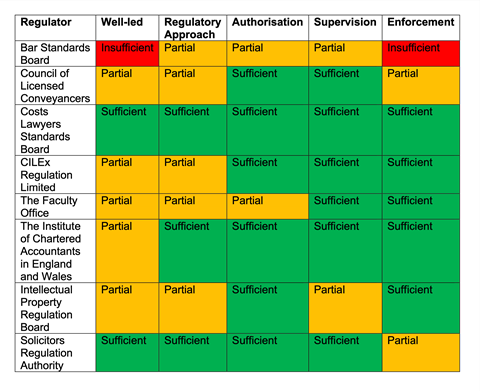Annual report card marks down bar’s regulator on leadership and enforcement – but barrister representatives counter that the Legal Services Board has fallen victim to mission creep
The bar’s regulator and the umbrella watchdog for legal services appear to be at loggerheads, after a new report came to a damning judgement of how complaints about barristers are handled.
An end-of-year assessment by the Legal Services Board rates the Bar Standards Board as ‘insufficient’ for leadership and enforcement qualities, the latest twist in the long-running saga about how well barristers are regulated. Last month it emerged the LSB had raised 13 ‘key issues of concern’ about the BSB, which has previously stated it needs more money.
According to the assessment, underlying issues with the bar regulator ‘are not improving and in some areas are further deteriorating’. Problems with its enforcement activities were said to be ‘significant’ and ‘longstanding’.
The BSB’s own performance review last month reported that just 21% of cases are being referred for regulatory action within two weeks, against a target of 80%. The same target is in place for completing investigations within 25 weeks, but that has been met in just 38.7% of cases.
In its response to the report, the bar regulator agreed it needs to improve the timeliness of decision-making, although it pointed out that in the last three months of 2022 it closed 61 investigations, compared with 31 in the previous quarter.
There are clear dividing lines between the bodies over certain policy decisions taken by the BSB. The LSB said performance had been ‘aggravated by a pattern of piecemeal and reactive responses to specific performance issues’. The BSB had been slow to respond to the collapsed direct access business Absolute Barrister and mishandled complaints arising from the Post Office scandal. The LSB is ‘concerned’ that the bar regulator’s decision to pause the investigation of barristers implicated in the Post Office inquiry appeared to have been made ‘without appropriate senior or board oversight’.
The BSB retorts that in some areas of criticism ‘we simply reached a different view’. It argues that the decision in relation to the Post Office scandal was taken with the full knowledge of its senior leaders. It added, moreover, that it continues to believe it acted promptly and proportionately to ensure barristers comply with the Russian sanctions regime.
‘It is quite legitimate for different regulators sometimes to have a different view about levels of risk,’ added the BSB.
Earlier this week, incoming bar chair Nicholas Vineall KC highlighted in his inaugural speech the BSB’s failure to meet performance targets. However, he was ‘cautiously optimistic’ about progress under the BSB’s new chair, Kathryn Stone.
Bar leaders are also concerned the LSB may be exceeding its remit as set out in the Legal Services Act. Vineall said the LSB had been ‘surprisingly explicit about its disapproval of the regulatory regime created by parliament, and under which it is supposed to operate, and equally explicit about its desire to be a sector-wide regulator’. The subsequent assessment of the BSB is unlikely to have eased any existing tensions.
The LSB has the statutory power to fine an under-performing regulator or even remove its leaders, although the Gazette understands these ‘nuclear options’ are not yet being considered. Rather pointedly, though, the oversight regulator warns that the BSB must now ‘fully engage with and accept the reasons for its under-performance.
‘We are hoping to see evidence of a determination to drive the step change in culture, capability and performance required for the BSB to become an effective regulator,’ it added.
SRA a ‘well-run regulator’

The Legal Services Board’s end-of-year report said the SRA had responded well to changes in regulatory policy, and learned lessons from its work and from other regulators.
The only area of concern surrounds the SRA’s enforcement work. The organisation could not provide enough evidence that it keeps those involved in its disciplinary processes informed about the progress of cases. During the year, it was revealed, members of the public had come to the LSB with issues about the SRA’s complaints-handling processes.
The LSB wants to see progress from the SRA in reducing its backlog of long-term cases, and increasing its capacity and capability in handling them. The only regulator meeting required levels across all categories was the Costs Lawyers Standards Board (see box, above).




































No comments yet